This content contains affiliate links. When you buy through these links, we may earn an affiliate commission.
The data on book bans shows precisely the themes and topics that are being targeted and that have been targeted since early 2021 in this most recent wave of censorship. Among them are books by and about LGBTQ+ people and people of color, books that explore social and emotional learning, and books that explore sexuality and puberty. But there’s another segment of books targeted that has not been as deeply explored as the others — indeed, while PEN America’s data notes that books about health and wellbeing were the second most frequently banned in schools in the 2022-2023 school year, that category is so broad that it fails to specify that many of those books are about disability.
July is Disability Pride Month. Like with Sexual Assault Awareness Month, it’s crucial to talk about in the context of book bans because people with disabilities are also targets of censorship and erasure. While Disability Pride Month is about celebrating disability, that celebration comes with reflection and the understanding that Pride is necessary because of the conditions, systems, and structures built to hinder and harm disabled people. We live in a world where even so-called “good” “blue” states are enacting bans on face masks under the guise of safety, putting the most vulnerable into even further harm and further isolation. That is the same goal of book banners: isolation and stigma.
Disenfranchisement is the perfect opportunity to roll back freedoms and protections that disability advocates have been fighting for generations. The Americans With Disabilities Act is only 34 years old, and as we’ve seen discrimination become a-okay with marginalized groups through Supreme Court decisions, it is not a leap to believe that further harm will be coming to disabled people. Indeed, the overturning of the Chevron Doctrine is yet another step to put power into the hands of the already powerful rather than those who are actual experts; Project 2025 also has its sights on overturning and removing protections for disabled people. All of this further sets the stage for mis-, dis-, and mal- information about disability to flourish and become a weapon against disabled people.
There’s a common saying that most of us have far more in common with the houseless than we do billionaires. Many are one mistake, one accident, one medical bill away from losing their entire livelihoods. The same goes for those who do not live with a disability, seen or unseen. We are all much closer to having one or being close with someone who does than never once encountering the possibility. This is for every reason you can surmise, including and especially climate change, the cost of healthcare, super-spreader illnesses like COVID, the anti-vaccine movement, mis/dis/mal information, and more.
Mental health issues are disability issues. That amounts to one out of every five U.S. adults. Attacks on books about social and emotional learning and books that explore diversity, equity, and inclusion are attacks on learning about and discussing mental health. Attacks on books about health and wellness are not only about sexuality and puberty; they’re also about people who live with limb differences, invisible illnesses, wheelchair users, dwarfism, and much, much more. Attacks on books with diversity, equity, and inclusion themes are not “just” about race or gender. They’re about disability and the intersections of disability, race, social class, gender, sexuality, and every other marginalization.
Anyone who isn’t the cishet white, able-bodied Christian male is not deemed worthy of much in our culture as it is. The targeting and removal of books that feature such people, both as characters or authors, is a reminder that more people than not are not seen as people at all.
Given the thousands of books banned since 2021 and given how much representation of the disability experience has grown in the last 10 years specifically — we’re seeing not only more voices and perspectives but we’re seeing far fewer stories meant to be inspiration porn for able-bodied people — it would be impossible to quantify just how many books with a disability theme, thread, or connection have been banned. But with the help of Tasslyn Magnusson’s book banning tracker and limiting the search to books banned in 2023 and 2024, here’s a sample of the disability-forward books targeted by censors. Note that this list does not necessarily reflect strong disability representation — this is because the vast majority of books targeted by censors are not new books but have an average publication date of 13-15 years ago.
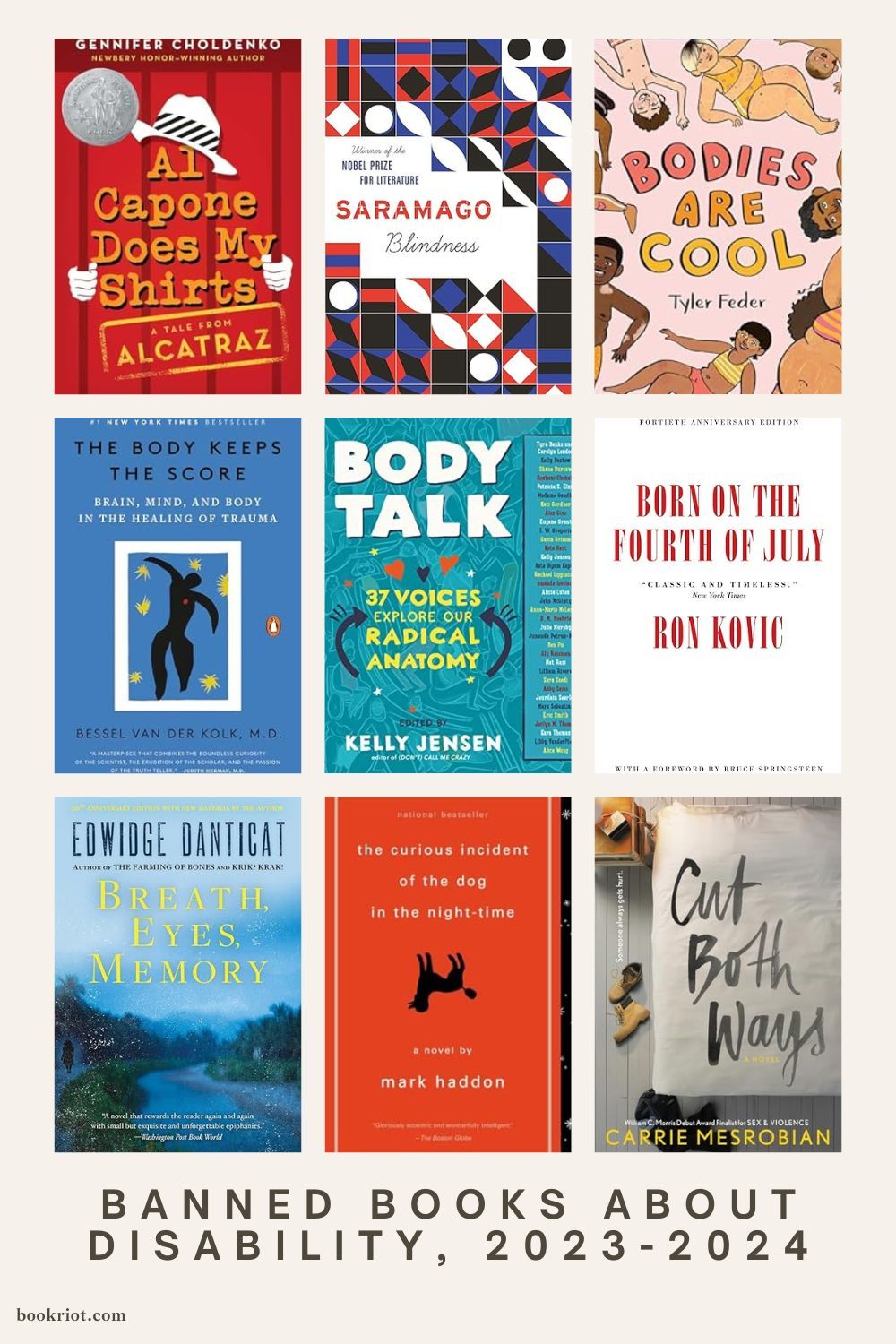

Al Capone Does My Shirts by Gennifer Choldenko, Blindness by Jose Saramongo, Bodies Are Cool by Tyler Feder, The Body Keeps the Score by Bessel van der Kolk M.D., Body Talk: 37 Voices Explore Our Radical Anatomy edited by Kelly Jensen (disclosure: me), Born on the Fourth of July by Ron Kovic, Breath, Eyes, Memory by Edwinge Danticat, The Curious Incident of the Dog at Nighttime by Mark Haddon, Cut Both Ways by Carrie Mesrobian
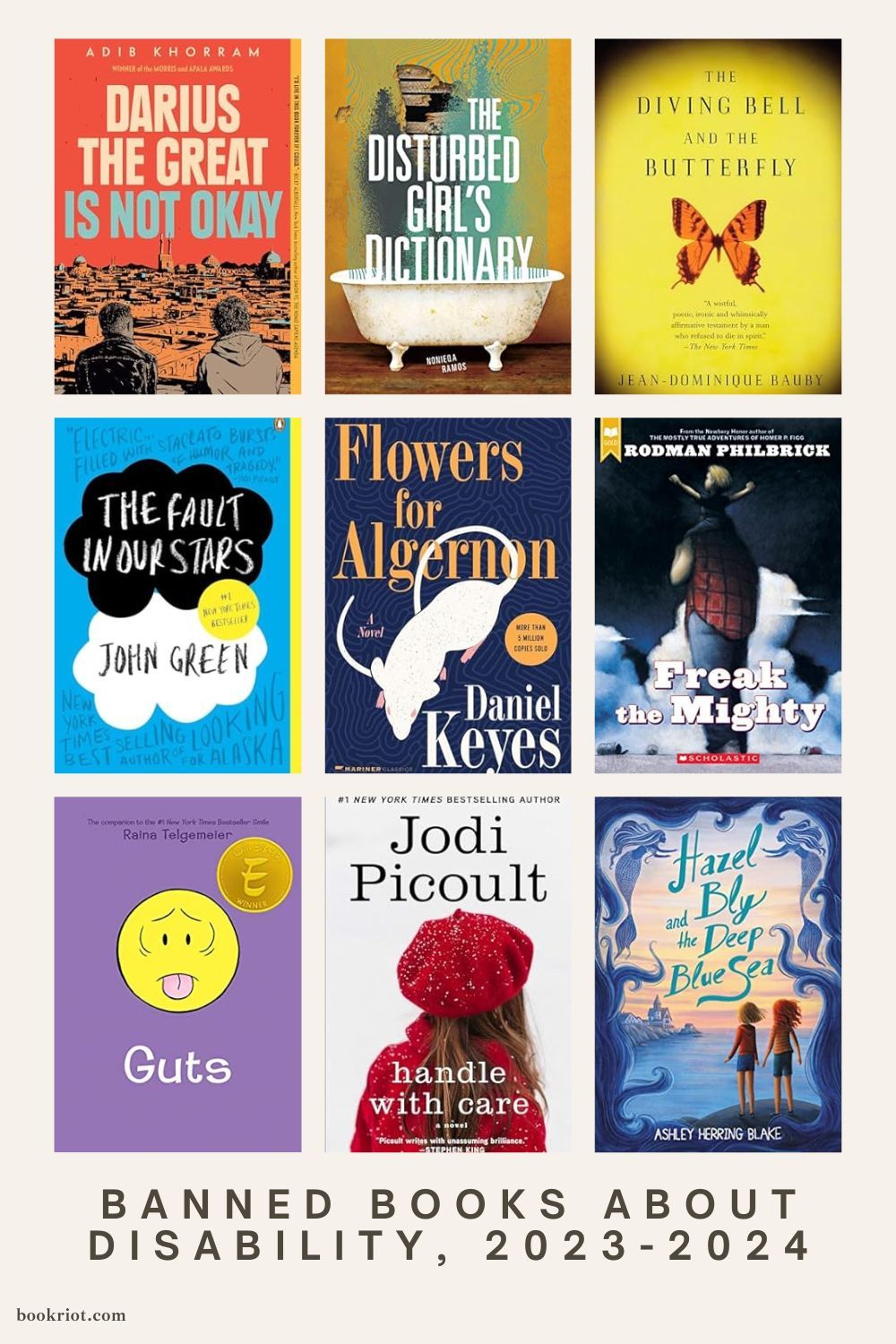

Darius the Great Is Not Okay by Adib Khorram, The Disturbed Girl’s Dictionary by NoNieqa Ramos, The Diving Bell and Butterfly by Jean-Dominique Bauby, The Fault in Our Stars by John Green, Flowers for Algernon by Daniel Keyes, Freak the Mighty by Rodman Philbrick, Guts by Raina Telgemeier, Handle With Care by Jodi Picoult, Hazel Bly and the Deep Blue Sea by Ashley Herring Blake
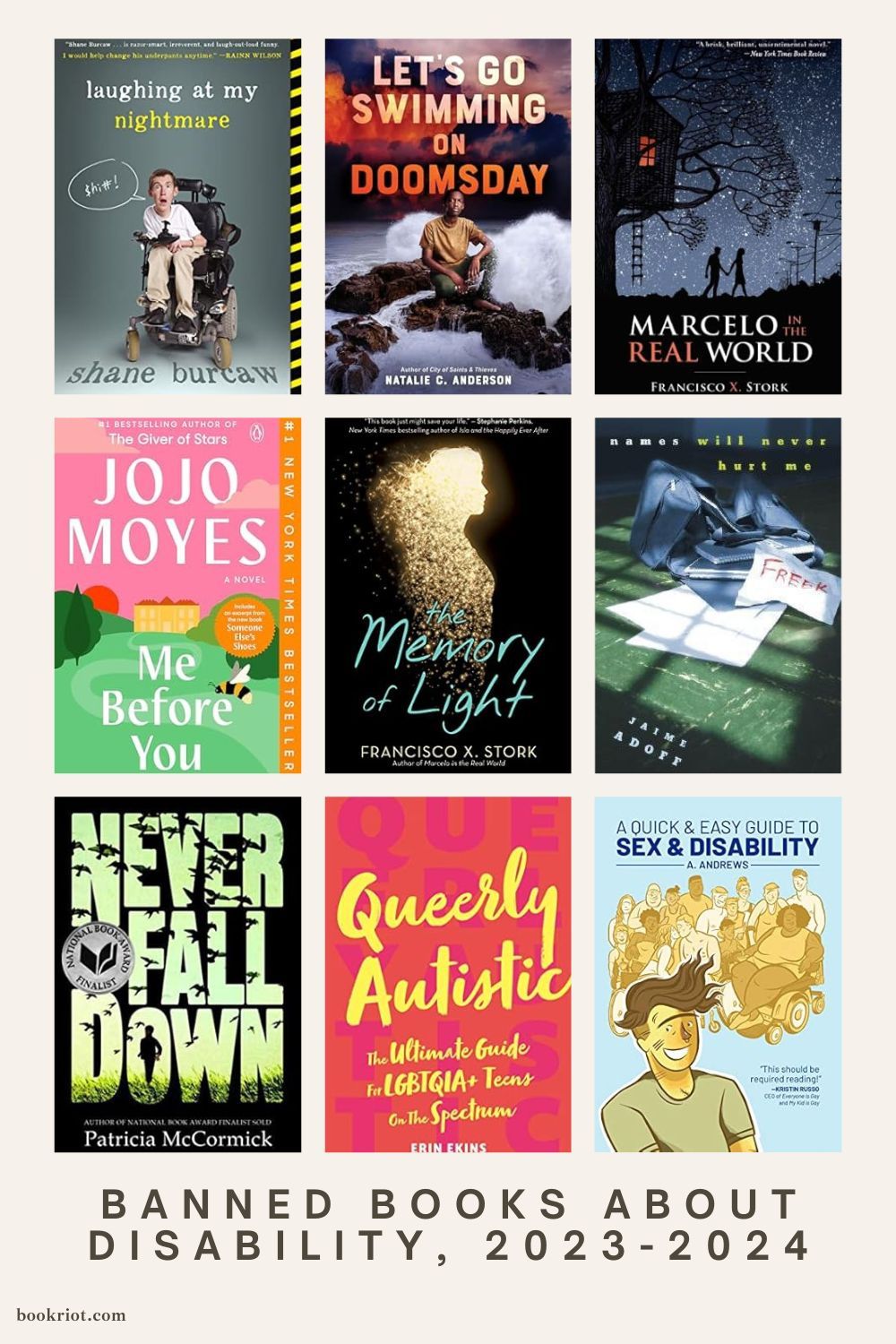

Laughing at My Nightmare by Shane Burcaw, Let’s Go Swimming on Doomsday by Natalie C. Anderson, Marcelo in the Real World by Francisco X. Stork, Me Before You by Jojo Moyes, The Memory of Light by Francisco X. Stork, Names Will Never Hurt Me by Jaime Adoff, Never Fall Down by Patricia McCormick, Queerly Autistic by Erin Ekins, A Quick and Easy Guide to Sex and Disability by A. Andrews
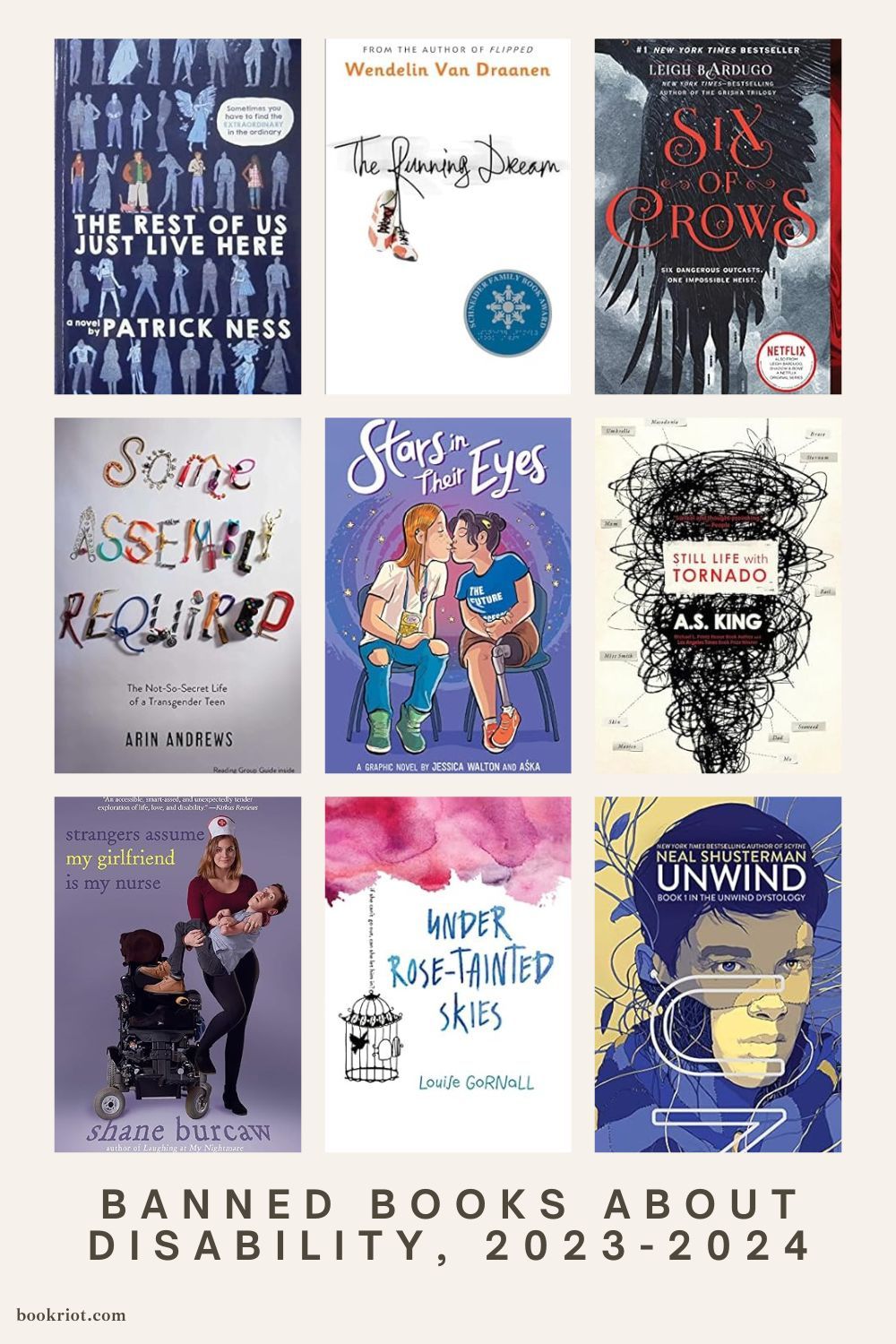

The Rest of Us Just Live Here by Patrick Ness, The Running Dream by Wendelin Van Draanen, Six of Crows by Leigh Bardugo, Some Assembly Required by Arin Andrews, Stars In Their Eyes by Jessica Walton and Aska, Still Life With Tornado by AS King, Strangers Assume My Girlfriend Is My Nurse by Shane Burcaw, Under Rose-Tainted Skies by Louise Gornall, Unwind by Neal Shusterman
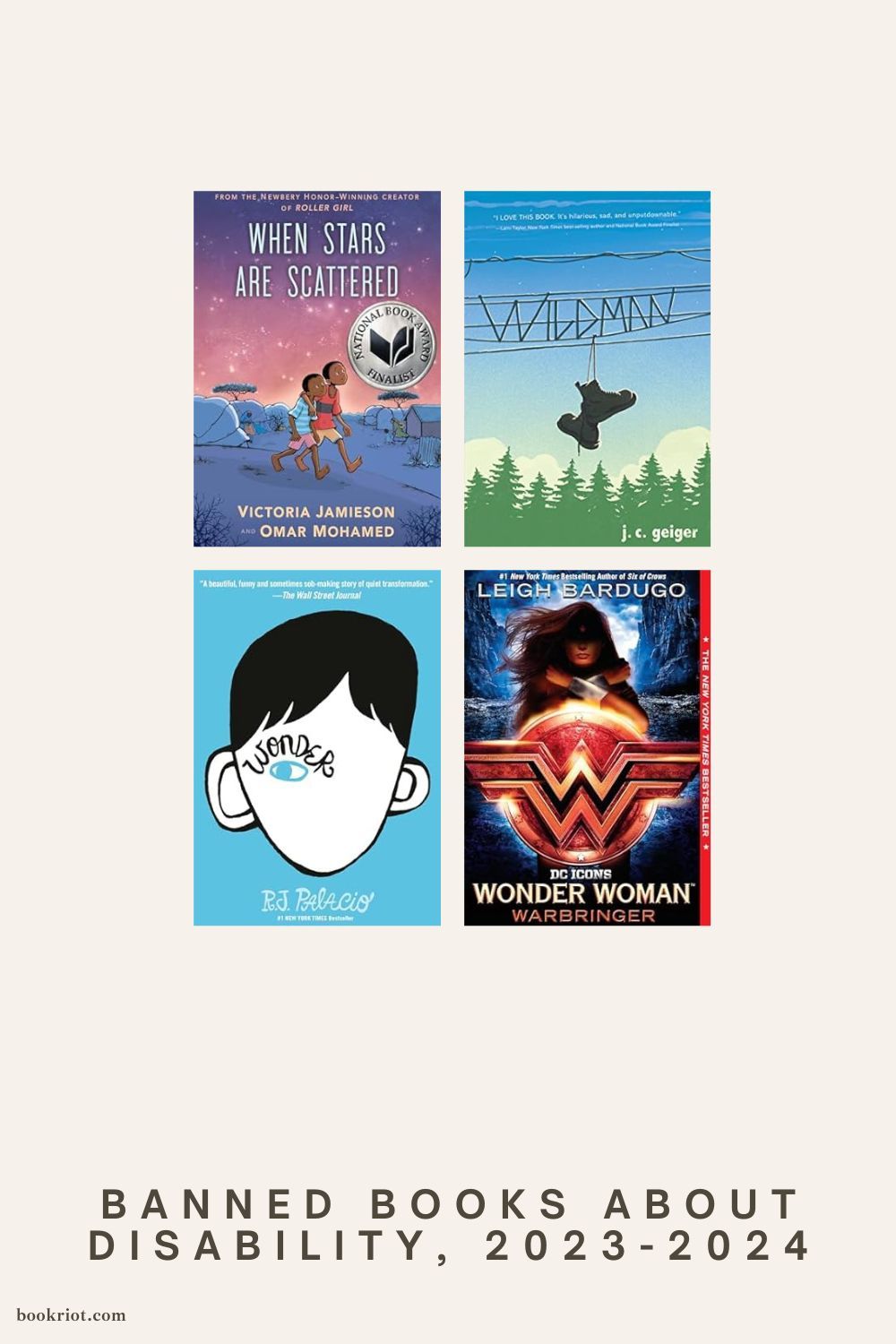

When Stars Are Scattered by Victoria Jamieson and Omar Mohamed, Wildman by J. C. Geiger, Wonder by RJ Palacio, Wonder Woman: Warbringer by Leigh Bardugo
Book Censorship News: July 12, 2024
- 5 books have been pulled from Katy Independent School District (TX) since April. One is a puberty book since we don’t want kids knowing about their own bodies. The books are Ares: God of War, Boy O Boy, The Almost Moon, The Haters, and The Girl Guide: 50 Ways to Learn to Love Your Changing Body.
- At least 30 recently acquired books in Cobb County Schools (GA) were banned because of a divisive concepts law. Also, Shakespeare.
- A federal appeals court will be re-reviewing the decisions made over a Llano County Public Library (TX) lawsuit. Note this is not the same lawsuit as the one brought by the Llano County director to the library nor is it the same one as the Texas READER Act lawsuit. More.
- In Escambia County (FL), the plaintiffs are asking the judge to demand that books removed from the district be put back on shelf until the lawsuit is decided. Yes, some 180ish books haven’t been available now since the start of this last year.
- Florida has eliminated references to “climate change” in some middle school textbooks.
- Tennessee’s new book ban law has added some new provisions, including one that looks quite like what Idaho did in its recent book banning bill.
- Harford School District (MD) decided to ban having AP African American Studies classes next year because it’s too political and divisive. I suppose so for white supremacists.
- “A state lawmaker says she’s ready to take the state school board and State Superintendent Ryan Walters to court after she says they violated Oklahoma’s Open Meeting Act when they refused to let her sit in on their executive session discussions last week.” We recognize fascism, right? Because there has been fascism in Oklahoma education for a long time now.
- Love Makes a Family is being challenged in the Menomonee Falls School District (WI). The board voted to remove it this week and…it’s not even required reading. It’s supplemental material.
- Alabama legislators, unhappy with the failure of their librarian criminalization bill this session, have already filed a new librarian criminalization bill for 2025. (See the roster of states that tried such legislation this year).
- Rockingham County School Board (VA) retained several challenged books this week, though it has banned A Court of Mist and Fury.
- Franklin County Schools (VA) are reminding parents that they can challenge books any time and are also gathering opinions on how
much easier they’d like to be able to ban booksthey think the books policy needs more updating. - (Paywalled) In Carroll County, Maryland, schools, parents are trying to get a pair of banned books unbanned. Also paywalled, the board is not going to allow the two books to be part of a family life curriculum because they show gay families.
- “Resident Tonia Stulting argued during her public comment section that the process to file a statement of concern is onerous and doesn’t allow a single patron to quickly submit multiple forms. She also said the process lacks oversight because the committee reviewing the concern is made up of librarians who put the book on the shelf to begin with.” The complaint in Madison Public Library (AL) from this citizen is she cannot plagiarize the Moms for Liberty website to get books banned and instead has to do her own work.
- In good news, it looks like the Metropolis Public Library (IL) is going to be back to a full board of directors and the new candidates care about the library. (If you need a primer on Metropolis, the board played a heroic role here in the hometown of Superman).
- Buried in this story is that the Dayton Public Library (OH) had a bomb threat. This upstanding citizen also left racist graffiti at a local school.
- Oklahoma history curriculum is being rewritten by some of the “thought leaders” behind Project 2025 and the movement for disinformation, including Ryan Walters. It’s getting uglier and uglier for public education in Oklahoma, thanks to fascist legislative leaders.
- King William public library (VA) joins two other libraries that have pulled out of a regional library system due to the belief the system permits “inappropriate books” to be shared among them. This is not only deliberately wrong information perpetrated by a board that is supposed to oversee the good of a library, but the celebration of how much cheaper this will be for the library does not get at how many fewer resources and how much less support that library will have, too. Watch this, folks — as I’ve said before, we’ll see more libraries go “independent” as a means of dismantling them all together.
- Mat-Su School District (AK) was “overwhelmed” with the number of book challenges they received and “streamlined” their review process. The most recent reviews were the final ones, and four more books were banned/restricted in the district: The Handmaid’s Tale graphic novel by Margaret Atwood, Tricks by Ellen Hopkins, and Living Dead Girl by Elizabeth Scott were all banned in the district, while Ellen Hopkins’s Perfect is restricted to the high school level only.
- “Iowa Attorney General Brenna Bird has filed a brief in federal court on behalf of 14 states defending an Arkansas law that prevents ‘indoctrination in K-12 schools.’” Read the language here. It’s a chilling interpretation of the First Amendment.
- Public libraries in South Carolina are subject to the draconian proviso written into the state budget. See this story, as both public and school libraries in South Carolina are now at the whim of conservative political interpretation.
